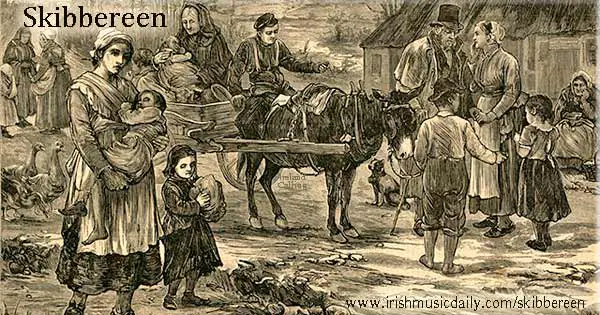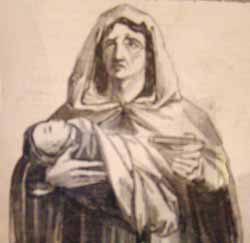
Skibbereen is one of the most famous songs to emerge from the time of the Irish Famine and the Young Irelander Rebellion of 1848.
Wave of emigration from Ireland
Skibbereen Videos
Lyrics and Chords
The verses are written in the form of a conversation between a father and his son.
It begins with the son describing how his father often talks about Ireland and its rugged beauty – a place “in which a prince might dwell”. The son then asks his father the obvious question: if it was so beautiful, why did you abandon it to go and live abroad?
 The father’s answers in the following verses relate to momentous events that took place in Ireland in the 1840s. There was famine, mass evictions of the Irish poor, a failed rebellion and forced emigration.
The father’s answers in the following verses relate to momentous events that took place in Ireland in the 1840s. There was famine, mass evictions of the Irish poor, a failed rebellion and forced emigration.
The stories of millions of Irish people in the mid 19th century are personified in the character of the father in Skibbereen.
And that’s the very reason I left old Skibbereen

The father begins his explanation of why he fled from Ireland by describing how a “blight came on the land”. This, of course, refers to the potato blight which caused the Great Famine between 1845 and 1848.
Potatoes were the staple diet of the Irish peasantry, and although Ireland also produced vast amounts of other foods like wheat and beef, most of it belonged to aristocratic English landlords who preferred to export it for profit rather than release it to feed the starving.
The Famine led to mass starvation in which more than a million people died of hunger and associated diseases. Even those who managed to keep themselves alive still faced unbearable hardship.
They not only relied on potatoes for food, they also needed them to sell in order to earn enough money to pay their rent.
Mass evictions of the Irish poor

The crop failure meant people were destitute and had no way of paying their way. It led to mass evictions in which hundreds of thousands of people were thrown out of their homes.
The small thatched cottages were often burned down, partly to clear the land but also as an example to others of what would happen if they defaulted on the rent.
The father refers to this in the third verse when he says “They set the roof on fire with their demon yellow spleen”. Most of the earlier versions of the Skibbereen refer to “English spleen” but most popular versions now substitute the word “yellow” for English.
News reporters headed there from London to report on the devastation being caused.
This is probably due to the great Irish traditional singer Joe Heaney who revived the song and brought it to a wider audience in the 1950s.
He told the writer Tom Munnelly that “the English have always been good to me and I’m not going to insult them just for the sake of it”.
Skibbereen and the wave of emigration from Ireland
Wave of emigration from Ireland
Skibbereen Videos
Lyrics and Chords
The Irish Famine Holocaust
https://ireland-calling.com/irish-famine/
https://ireland-calling.com/how-irish-famine-could-have-been-prevented/
https://ireland-calling.com/irish-famine-ireland-exported-food-as-thousands-starved/
https://ireland-calling.com/irish-famine-tom-guerin-boy-buried-alive/
https://ireland-calling.com/mike-nicholson-dark-rosaleen-book-irish-famine/
https://ireland-calling.com/choctaw-donation-irish-famine/
https://ireland-calling.com/irish-potato-famine-donations-to-the-starving/
https://ireland-calling.com/lifestyle/child-skeletons-offer-unique-insight-of-life-in-famine-workhouses/
https://ireland-calling.com/lifestyle/governor-wants-the-great-famine-taught-in-california-schools/
https://ireland-calling.com/lifestyle/cork-statue-pays-tribute-to-choctaw-tribes-generosity-during-irish-famine/
https://ireland-calling.com/st-patrick/irish
